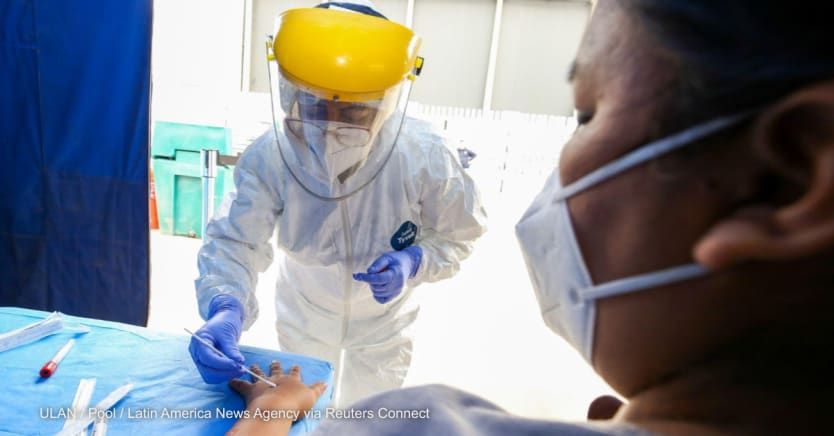What is a public health emergency? Monkeypox outbreak raises questions

World Health Organization Director-General Tedros Adhanom Ghebreyesus, at a press briefing Wednesday, said he plans to reconvene the International Health Regulations emergency committee on monkeypox during the week of July 18, or “sooner, if needed.”
According to WHO, more than 6,000 cases of monkeypox have now been reported in 58 countries globally, and it’s likely to be an underestimate. Tedros said there’s a “high probability” that a significant number of cases are not being picked up as testing is a challenge. Europe is the current epicenter of the outbreak, accounting for more than 80% of cases.
The announcement comes more than a week after WHO decided not to declare the current multicountry monkeypox outbreak a public health emergency of international concern, or PHEIC. This decision came as a surprise to several experts who argued that the criteria guiding the determination of such a declaration have already been met.
The unexplained transmission of the virus in countries where it’s not been reported before, and many of the cases not having any known links in countries where the disease has been endemic for decades, is unusual and requires international cooperation, which can be set off by declaring the current outbreak a PHEIC.
“I worry that the world only has a short window within which it can contain the current monkeypox outbreaks before the virus becomes entrenched in large populations beyond MSM [men who have sex with men] communities,” said Lawrence Gostin, a professor at Georgetown University and founding O'Neill chair in global health law, who believes the IHR emergency committee advising the WHO chief should have recommended the declaration of a PHEIC.
“I would rather the [IHR emergency committee] overreacted than under-reacted. It is better to err on the side of decisive action,” he told Devex via email.
The must-read weekly newsletter for exclusive global health news and insider insights.
The declaration of a PHEIC allows the WHO director-general to issue a set of recommendations for what countries should and should not do in response to a health emergency, such as on travel for example. Its declaration is seen as the “loudest alarm” to boost global attention and resources to address the problem. But reviews of the COVID-19 response also showed it didn’t immediately trigger robust responses “in most countries” until March 2020, when WHO characterized it as a pandemic.
The declaration of a PHEIC has been a contentious debate for years among experts, and WHO director-generals, past and present, have been criticized for being slow to declare one. The Independent Panel for Pandemic Preparedness and Response said in its report, for example, that WHO could have declared COVID-19 a PHEIC during its first meeting on Jan. 22, 2020, and not a week later.
The calls to declare a PHEIC in the current monkeypox outbreak add additional complexity. Several African countries have experienced monkeypox outbreaks for years, but no PHEICs were declared then.
“African countries have a valid argument of a double standard. The urgency over monkeypox in high-income countries was never seen in the many years that Africa struggled with monkeypox. In addition, Africa has not [been] prioritized for vaccines and drugs, even though monkeypox in that region has a far higher hospitalization and death rates,” Gostin said.
The problem, several experts mentioned, lies in the design of the PHEIC itself. Some say it’s too broad, and can be applied in outbreaks happening in one country, a region, or several regions of the world. Different expert committees interpret the criteria for declaring a PHEIC differently, resulting in its inconsistent use.
“Either the IHR criteria need to be altered or the [IHR emergency committee] must be more faithful to following the Regulations,” Gostin said.
Meanwhile, some experts find the criteria vague — what exactly constitutes an “extraordinary event” is not well defined, and whether a declaration should be based on actual data on the spread of a disease or its potential risk of spreading to more countries remains unclear. It’s also limiting, giving WHO only two options: declare a PHEIC or don’t.
“This new incident confirms, if there was a need, that the binary nature of the PHEIC system under the IHR is an obstacle to a more rational and clear risk assessment of events that don’t necessarily check all the boxes,” said Gian Luca Burci, an adjunct professor of international law at the Graduate Institute of International and Development Studies in Geneva, in an email to Devex.
“I hope there will be an open and unbiased discussion on such a crucial point during the process to amend the IHR,” he added.
Gostin said giving the emergency committee an option to declare an intermediate level of alert for public health emergencies “would be helpful.”
“If that had been a legal option, it is clear the [IHR emergency committee] would have triggered an intermediate global alert level,” he said, citing the diverging views among IHR committee members on whether to declare the current monkeypox outbreak a PHEIC. Three of the experts on the committee were in favor of declaring the outbreak a PHEIC, said WHO Director-General Tedros Adhanom Ghebreyesus during a press briefing last week. But 11 of the experts wanted more data on the cases and laid out several instances when a reassessment should be made.
A U.S. proposal for targeted amendments to the IHR includes a provision that allows the WHO director-general to issue an intermediate public health alert where an event does not fall under the criteria for a PHEIC declaration, but requires a “heightened international awareness and a potential international public health response.” The proposal also allows a WHO regional director to determine an event as a public health emergency of regional concern and provide guidance to member states in the affected region even before it’s considered a PHEIC.
Amendments to the IHR, however, are unlikely to happen soon. At the recently concluded 75th World Health Assembly, member states agreed to further discuss it and for a final proposed package of amendments to be considered at the 77th World Health Assembly expected to take place in May 2024.
An IHR review committee however previously identified drawbacks in having an intermediate level of alert for health emergencies, saying it won’t address countries’ noncompliance to the IHR and may only further complicate assessments of a health event.
While WHO stopped short of declaring the current monkeypox outbreak a global emergency of concern, its officials have expressed concerns on the continuing increase in cases and its potential spread to high-risk groups such as children, pregnant women, and immunocompromised individuals.
Dr. Hans Kluge, WHO regional director for Europe, on Friday called for governments and civil society to scale up efforts to prevent its further spread in the region, which saw a tripling of cases over the past two weeks.
He seemed to anticipate that the International Health Regulations emergency committee will likely meet again soon and change their earlier stance.
“Although last week the IHR Emergency Committee advised that the outbreak at this stage should be determined to not constitute a Public Health Emergency of International Concern (PHEIC), the rapid evolution and emergency nature of the event means that the Committee will revisit its position shortly,” he said in the statement.

Search for articles
Most Read
- 1
- 2
- 3
- 4
- 5








